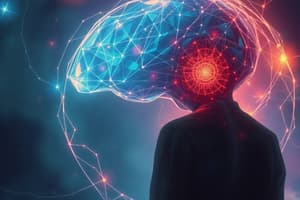Podcast
Questions and Answers
What are Neo-Freudians?
What are Neo-Freudians?
- Followers of Freud who developed their own competing theories of psychoanalysis (correct)
- Psychologists who reject all of Freud's ideas
- Scientists who focus solely on sexual behavior
- Psychoanalysts who only practice Freudian methods
Who developed the theory of a collective unconscious?
Who developed the theory of a collective unconscious?
Jung
What is the personal unconscious according to Jung?
What is the personal unconscious according to Jung?
Jung's name for the unconscious mind as described by Freud
Define collective unconscious.
Define collective unconscious.
What are archetypes in Jung's theory?
What are archetypes in Jung's theory?
Who proposed feelings of inferiority as the driving force behind personality?
Who proposed feelings of inferiority as the driving force behind personality?
What concept did Horney reject in her theory?
What concept did Horney reject in her theory?
What is basic anxiety?
What is basic anxiety?
What are neurotic personalities according to Horney?
What are neurotic personalities according to Horney?
Who developed a theory based on social rather than sexual relationships?
Who developed a theory based on social rather than sexual relationships?
Flashcards
Who are Neo-Freudians?
Who are Neo-Freudians?
Psychoanalysts who adapted Freud's theories, often disagreeing with his emphasis on sexual drives.
Who is Jung?
Who is Jung?
Theorist who expanded the unconscious to include universal human experiences.
What is the personal unconscious?
What is the personal unconscious?
According to Jung, it's the individual's own unconscious experiences.
Define collective unconscious.
Define collective unconscious.
Signup and view all the flashcards
What are archetypes?
What are archetypes?
Signup and view all the flashcards
Who is Adler?
Who is Adler?
Signup and view all the flashcards
What did Horney reject?
What did Horney reject?
Signup and view all the flashcards
What is basic anxiety?
What is basic anxiety?
Signup and view all the flashcards
What are neurotic personalities?
What are neurotic personalities?
Signup and view all the flashcards
Who is Erikson?
Who is Erikson?
Signup and view all the flashcards
Study Notes
Neo-Freudians
- Followers of Freud who advanced their own theories of psychoanalysis, diverging from traditional Freudian concepts.
Carl Jung
- Introduced the concept of the collective unconscious, a shared part of the unconscious mind that is universal among humans.
- Identified the personal unconscious, aligning with Freud's view of the unconscious mind.
- Proposed archetypes, representing universal symbols and themes intrinsic to the human experience.
Alfred Adler
- Suggested that feelings of inferiority drive personality development and behavior.
- Developed the birth order theory, positing that one's position among siblings influences personality traits.
Karen Horney
- Focused on basic anxiety, which arises when a child faces the overwhelming world of adults and older peers.
- Rejected Freud’s notion of penis envy, advocating for a more balanced view of gender dynamics in psychology.
- Identified neurotic personalities as maladaptive approaches to interpersonal relationships, stemming from basic anxiety.
Erik Erikson
- Created a psychosocial development theory emphasizing social relationships over sexual ones.
- His framework encompasses the entire lifespan, proposing eight stages of development, each characterized by specific social and emotional challenges.
Studying That Suits You
Use AI to generate personalized quizzes and flashcards to suit your learning preferences.




